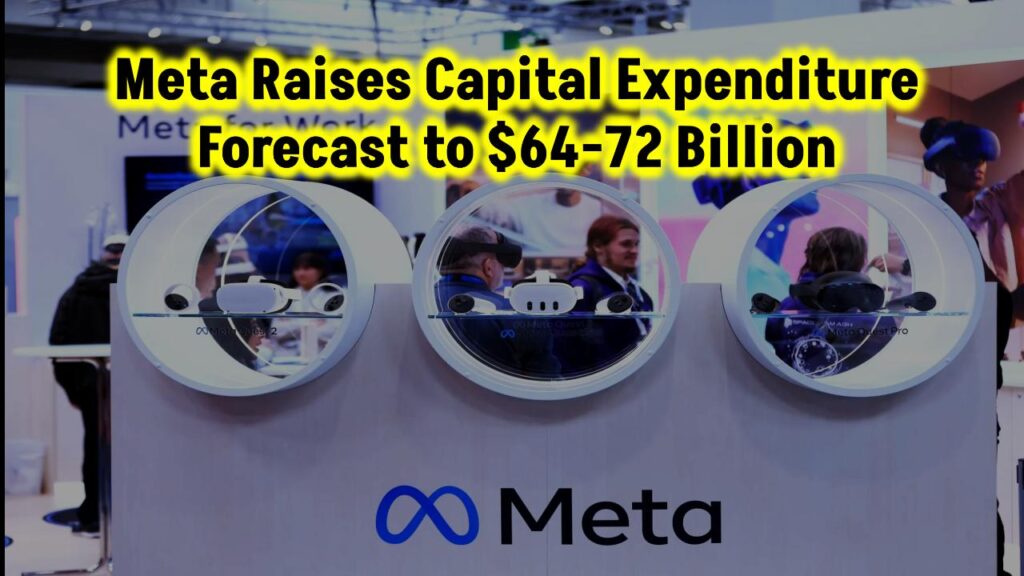Meta Raises Capital Expenditure Forecast: Meta Raises Capital Expenditure Forecast to $64–72 Billion to Boost AI Development in 2025. This bold move reflects the tech giant’s deepening commitment to artificial intelligence (AI) and positions Meta as a front-runner in the global race for AI dominance. From powering smart assistants to enhancing advertising tools, Meta is betting big on AI to drive innovation, improve user engagement, and shape the digital landscape of the future.

This increase from its previous forecast of $60–65 billion underscores Meta’s aggressive strategy to outpace competitors in AI infrastructure, tools, and computing power. The investments touch every corner of Meta’s vast digital ecosystem, including Facebook, Instagram, WhatsApp, Messenger, and its VR and AR divisions.
Meta Raises Capital Expenditure Forecast
| Category | Details |
|---|---|
| Capital Forecast | Increased to $64–72 billion for 2025 |
| AI Infrastructure | Plan to deploy 1.3 million GPUs and build a $10B Louisiana data center |
| Renewable Energy | Data center aims to match 100% electricity usage with renewables |
| Product Development | Focus on Meta AI assistant and next-gen LLaMA 4 LLM |
| Financial Performance | Q1 2025 revenue: $42.31B (+16% YoY); Net income: $16.64B (+35%) |
| Regulatory Risks | Facing FTC lawsuits and EU DMA compliance issues |
| Official Website | Meta.com |
Meta’s decision to raise its 2025 capital expenditure to $64–72 billion is a bold, strategic move that underscores its ambition to lead in AI innovation. From building data centers to rolling out smarter assistants and open-sourcing cutting-edge tools, Meta is setting the pace in a rapidly evolving tech landscape. While challenges remain—especially from regulators—the company’s focus on infrastructure, product development, and sustainability shows it’s playing the long game. For professionals, businesses, and investors alike, it’s time to pay close attention.
Why Is Meta Spending So Much on AI?
Meta’s business model relies heavily on digital advertising, content delivery, and user engagement. AI enhances all of these. With generative AI tools like chatbots, recommendation engines, and content moderators, Meta can provide a more personalized and secure user experience. This translates into higher engagement rates—and ultimately—greater ad revenue.
Meta also views AI as the foundation for future technologies, including the metaverse. CEO Mark Zuckerberg has often described AI as “central to unlocking the next era of computing.”
Major Components of the Investment
1. Infrastructure Expansion
Meta plans to deploy around 1.3 million GPUs by the end of 2025. These chips are essential for training and running complex AI models like LLaMA. Meta is also building a 2-gigawatt data center in Richland Parish, Louisiana—a project valued at $10 billion. This facility is designed with sustainability in mind, aiming to use 100% renewable energy for its operations.
2. Product Development: Meta AI Assistant & LLaMA 4
Meta is working on the next iteration of its AI assistant, Meta AI, and a new large language model (LLM), LLaMA 4. These tools will be used across its ecosystem to improve user personalization and automate workflows, from customer service to content creation.
3. Boosting Revenue Through AI-Powered Advertising
In Q1 2025, Meta saw a 16% year-over-year revenue increase to $42.31 billion, and a 35% increase in net income to $16.64 billion. A significant contributor to this growth was AI-powered ad targeting and optimization.
By integrating machine learning into ad platforms, Meta enables advertisers to better reach the right audiences with the right messages, maximizing ROI. According to Moomoo, Meta’s AI-driven ads now account for over 60% of total ad impressions.
4. Environmental Responsibility
Meta’s Louisiana facility isn’t just big—it’s green. The company pledges that this massive center will run on 100% renewable energy, part of its broader goal to achieve net-zero emissions across its operations by 2030.
5. Navigating Regulatory Challenges
Despite its success, Meta faces regulatory scrutiny. The U.S. Federal Trade Commission (FTC) has filed legal actions against Meta concerning data privacy and competition practices. Meanwhile, the European Union’s Digital Markets Act (DMA) places new restrictions on how big tech can operate in the EU.
Failure to comply could lead to fines or restrictions that may affect Meta’s international revenue streams. Staying compliant while innovating is a balancing act the company must master.
What This Means for Tech Professionals and Investors
If you’re a developer, data scientist, or AI researcher, Meta’s push means thousands of new jobs, open-source projects, and research opportunities. For example, Meta recently open-sourced LLaMA 3, and LLaMA 4 is expected to follow suit, allowing broader experimentation in academia and enterprise.
If you’re an investor, this signals confidence in long-term growth. Meta is banking on AI to be its next major revenue engine. However, you’ll also want to monitor regulatory developments and cost management, as high capital expenditure can strain margins if growth slows.
Practical Takeaways
- Learn AI Now: With Meta investing heavily, skills in AI/ML are more valuable than ever.
- Follow Open Source Releases: Watch for LLaMA 4 and other models on Meta’s GitHub.
- Sustainability Is the Future: Green data centers will soon become the norm.
- Monitor Regulations: Stay informed about privacy and competition laws if you’re in tech policy or product design.
FAQs on Meta Raises Capital Expenditure Forecast
Why did Meta raise its capital expenditure forecast?
To accelerate AI infrastructure, develop more powerful models like LLaMA 4, and expand renewable-powered data centers. It reflects the growing importance of AI in Meta’s long-term vision.
What is LLaMA 4?
LLaMA 4 is Meta’s upcoming large language model (LLM), expected to compete with OpenAI’s GPT-5 and Google’s Gemini. It’s designed for more natural conversations, content generation, and enterprise use.
Is Meta AI available to the public?
Yes, Meta AI is being rolled out in stages across Facebook, Instagram, and WhatsApp. Developers can also access models and APIs via Meta’s AI research portal.
Will this investment affect Meta’s stock?
Possibly. Big investments can signal confidence and boost investor sentiment. However, returns may take time, and increased spending can create short-term margin pressure.
How does Meta plan to use renewable energy?
Meta’s Louisiana data center is engineered to match its entire energy consumption with 100% renewable sources, supporting its net-zero emissions goal by 2030.





